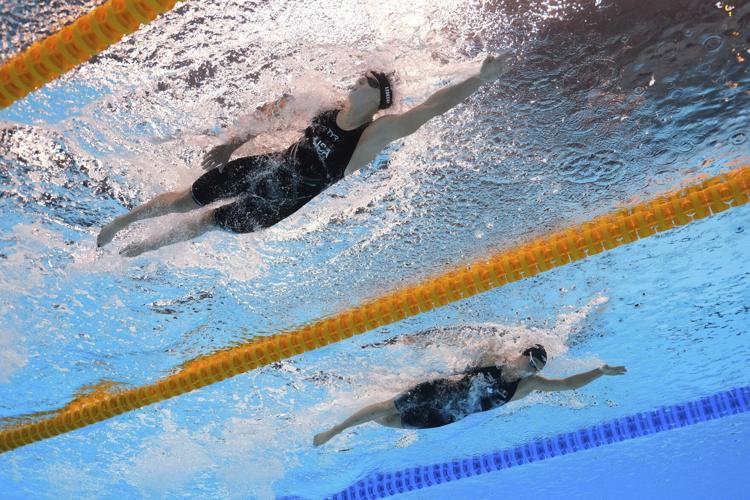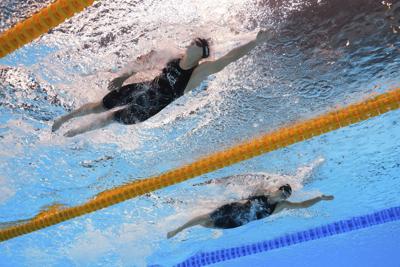│ž▒§▒Ě│Ď┤í▒╩░┐ŞÚĚíÔÇöSummer McIntosh leaned on the steel rail, her lungs still burning, her eyes still burning. She had tried to conquer Katie Ledecky in Katie LedeckyÔÇÖs favourite race, and on Saturday the Canadian found out what that meant. With 100 metres to go, McIntosh grabbed her only lead, but it was too late. Ledecky closed with her peerless command, and Australian Lani Pallister passed┬áMcIntosh as well in the final 50.┬áMcIntosh finished third in 8:07.29.
In the media room, veteran writers were already calling it the greatest distance race of all time, and the greatest distance swimmer of all time won it. But CanadaÔÇÖs 18-year-old phenom will burn over this race for years, and afterward she was so raw and honest. This race cracked her open, a bit.
ÔÇťI hate losing more than I like winning, and I think that’s a mentality that I’ve carried with myself throughout my entire career, and that’s really what gets my hand on the wall first most of the time,ÔÇŁ said McIntosh. ÔÇťThe feeling right now is something that I never want to feel again. This is what I felt in Fukuoka 2023 after the 400 free (where she finished fourth), what I felt at the Olympics in Paris when I got silver in the 400 free. Moments like this is really what I think about in training when I’m dying during a hard set and I need to keep pushing.ÔÇŁ
Canada's Summer McIntosh emerged with a bronze medal after a three-way duel from start to finish in the women's 800-metre freestyle Saturday in Singapore. (Aug. 2, 2025)
The Canadian PressIt was a magnificent, towering, indelible race: McIntosh in lane three, 28-year-old Ledecky in lane four, 23-year-old Pallister in lane five. On the blocks, Ledecky stared across at McIntosh, and┬áMcIntosh looked elsewhere. Then Ledecky controlled the pace from the start. That wasnÔÇÖt McIntoshÔÇÖs plan.
ÔÇť(We wanted) the opposite of what happened,ÔÇŁ said McIntosh’s coach, Fred Vergnoux. ÔÇťWe knew the race would go out 4:01, and the race went 4:01, but the idea was for┬áMcIntosh to be faster than that, and then to make them suffer, you know?ÔÇŁ

Katie Ledecky, left, and Summer McIntosh stand together on the podium after the 800-metre freestyle event.
AFP via Getty ImagesMcIntosh┬áis the fastest 400-metre freestyler in the world right now ÔÇö she was over two seconds faster than Ledecky in the 400 free here ÔÇö but she didnÔÇÖt make them suffer.┬áMcIntosh was fit enough; she nearly broke that unbreakable 200 butterfly record two days earlier. Her freestyle, which she hasnÔÇÖt always trusted, was good enough. Her turns, too.
But this was racing a god, and we saw that incredible rarity from this incredible athlete: McIntosh lost control. She was supposed to up the tempo around the 150-metre mark; the only time she led the race was by 0.14 seconds with 100 metres to go. Listening to her afterward, you remembered this was only the second time she has swum this race at a major meet, and the first time she had been in a distance race of this quality and intensity. It showed.
ÔÇťI think I didn’t stay in the moment as well,ÔÇŁ said McIntosh. ÔÇťI was a little bit all over the place. I was thinking too much, because there’s a lot of time to think in an 800.ÔÇŁ
She wasnÔÇÖt kidding. She talked about how she thought too much about Ledecky being beside her┬áÔÇö thinking about keeping up, and about keeping Ledecky from taking over. She talked about how she had raced Ledecky so many times and how she could tell Ledecky had a lot left, and she didnÔÇÖt feel the same. Vergnoux said┬áMcIntosh also changed her style a bit: looking right toward the end of legs instead of just keeping to her preferred left-side breathing pattern.
ÔÇťDoing things that she never does in training,ÔÇŁ said Vergnoux. ÔÇťThe breathing pattern was not usual, the way she was turning. I think she was maybe overthinking.ÔÇŁ
McIntosh┬álikes to say she doesnÔÇÖt feel nerves so much as adrenalin, but then thatÔÇÖs easier to say when you almost never lose. This was the only race she swam here where she wasnÔÇÖt a favourite, and even that is understating the case.┬áMcIntosh has three gold medals and will likely add a fourth Sunday in the 400 individual medley. But this was the greatest peak.
ÔÇťJust a master,ÔÇŁ said Vergnoux of Ledecky. ÔÇťLike the van Gogh of painting. Just in control from the first stroke to the last.ÔÇŁ
Even with all that, the race was a duel. Ledecky pushed, and McIntosh was right on her shoulder. On the other side Pallister (the bronze medallist in the 1,500) went, too, and was tied with McIntosh at 400 metres. They were separated by milliseconds, but Ledecky was in charge. Vergnoux knew early that this would be difficult.
And┬áMcIntosh faded, which makes sense. She swam 8:05.07 at the trials, yes, but has only been training for this race for seven months. Ledecky kicked and finished in 8:05.62, and Pallister kicked and finished in 8:05.98. No womenÔÇÖs 800 has ever been this fast and this close.
ÔÇťI mean, I think I’ve been a part of a race of the century maybe six times in the last decade,ÔÇŁ said Ledecky. ÔÇťIt’s up to you guys to say what is the race of the century, or the race of the meet.
ÔÇťI mean, this is my favourite event. It was my first gold (at the 2012 Olympics). I mean, even in practice, if I’m doing 800s I kind of tell myself ÔÇö I kind of have this fake rule, like, I don’t lose 800s.ÔÇŁ
SheÔÇÖs only lost one since 2013, to┬áMcIntosh at a minor meet. If you squinted, you could almost see LedeckyÔÇÖs competitive steel in her answers┬áÔÇö the way she downplayed the greatness of the race, the way she opened her press conference by saying: ÔÇťI mean, it was a fabulous race, 8:07.29 getting third. That’s under the championship record.ÔÇŁ
Ledecky didnÔÇÖt mention PallisterÔÇÖs time; just McIntoshÔÇÖs. Maybe it was a coincidence, or maybe the desire and pride that has driven Ledecky to be this great at age 28 is a volcano and this is how it erupts. She did admit the race was stressful at times, sure, but also that she slept well all week.
There has probably never been a race that should make you appreciate Ledecky more than this. And to see her in that furnace, surrounded and pressed but still the alpha of all alphas, should make you appreciate just how significant it was that this was the task that an 18-year-old wunderkind decided to take on.
And this will be fed into McIntosh’s furnace every day, but it was a measure of the power of this race, the depth of it, that McIntosh in one breath was defiant: ÔÇťI mean, this isn’t my favourite race, but that definitely will fuel me to continue to do it until I master it, and I go the times and execute it the way I want, stand on top of the podium at the international level.ÔÇŁ
And she also talked about how this gave her flashbacks to deep disappointments, and she said: ÔÇťI mean, it’ll definitely take some time. This is a new event for me, and I have lots to learn in it. And yeah, we’ll have to see where it takes me the next few years heading into L.A., whether I ÔÇŽ I don’t know.ÔÇŁ
This race. The last 200, Ledecky told herself to trust her legs and she could, and┬áMcIntosh couldn’t. Ledecky said that if her season ended at her world record in this event in May, her first in the 800 since 2016, she would have been satisfied and that took the pressure off;┬áMcIntosh didnÔÇÖt have that. Again, it’s incredible she tried this.
ÔÇťI told you many times, we don’t value this girl, what she’s doing,ÔÇŁ said Vergnoux. ÔÇťEverybodyÔÇÖs like, why she doesn’t win? She’s not a machine, you know. She’s 18 years old, a girl that swims against the best in the world. And she decided to do that. All the way.
ÔÇťNow, she’s going to learn from that. But she made a big statement, a massive statement of: I want to win five gold medals. What does it mean? Means I need to beat Ledecky. I think thatÔÇÖs, excuse my French, big balls to do that for a young girl.ÔÇŁ
He said that was the most intense he had ever seen her after a race, and that it was one of the very best races he had ever seen. McIntosh came into this race with three world records on the books, with a near world record in the 800, with a near world record in the most unbreakable world record race, and this was swimming Valhalla.
She will swim the 400 IM Sunday to complete an incredible week. Michael Phelps won five individual gold medals (and two relay golds) at the 2007 world championships as practice for his eight-medal epic in Beijing 2008, which became the apex of his ÔÇö or anyone elseÔÇÖs ÔÇö career.┬áMcIntosh is rehearsing for Los Angeles three years before the Olympics arrive, which made her chase different. This isnÔÇÖt building to a peak next year; this is building toward mountains that remain in the distance. PhelpsÔÇÖs goal was obvious: break Mark SpitzÔÇÖs record of seven golds in a single Olympics. For McIntosh, nobody can measure the altitude of the peaks in her future.
This meet was one, and Summer aimed for the highest peaks of the sport. She fell just short.






























To join the conversation set a first and last name in your user profile.
Sign in or register for free to join the Conversation